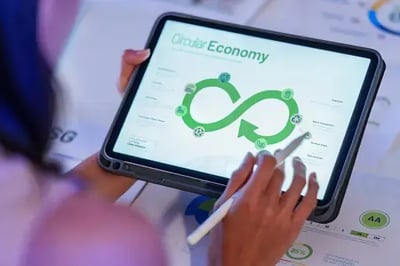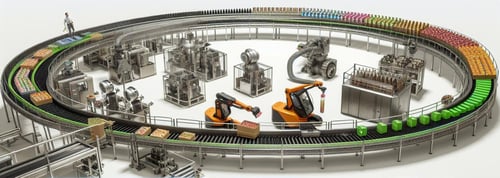Circular Economy Principles: Improving Production Planning
The importance of sustainability and environmental consciousness cannot be overstated. Industries across the globe are recognizing the urgent need to shift towards more sustainable practices, and the manufacturing sector is no exception. For food and beverage manufacturers, adopting circular economy principles isn't just a choice; it's a necessity for long-term survival and prosperity.
In this blog, we will look into the significance of integrating circular economy principles into production planning, particularly in the context of Manufacturing IT, and how the synergy between PlanetTogether and leading ERP, SCM, and MES systems can drive this transformation.

Understanding Circular Economy Principles
Before we explore how circular economy principles can revolutionize production planning, it's crucial to grasp what they entail. Unlike the traditional linear economy, where resources are extracted, used, and disposed of, a circular economy aims to keep resources in use for as long as possible, extracting the maximum value from them while in use, then recovering and regenerating products and materials at the end of their service life.
This shift from a 'take-make-waste' model to a 'reduce-reuse-recycle' approach is not only environmentally responsible but also economically viable in the long run.

Challenges in Food and Beverage Manufacturing
The food and beverage manufacturing industry faces unique challenges when it comes to adopting circular economy principles. From managing perishable raw materials to minimizing waste in packaging and distribution, there are numerous complexities involved. Additionally, fluctuating consumer demand, stringent regulatory requirements, and evolving market trends further complicate production planning efforts. In such a dynamic landscape, traditional planning methods fall short in optimizing resource utilization and minimizing environmental impact.

The Role of Manufacturing IT
Manufacturing IT plays a pivotal role in orchestrating the transition towards a circular economy in food and beverage manufacturing. By leveraging advanced technologies such as Artificial Intelligence (AI), Internet of Things (IoT), and Data Analytics, IT systems can streamline operations, enhance visibility across the supply chain, and enable real-time decision-making. However, the true transformative power lies in the integration of Manufacturing Execution Systems (MES), Supply Chain Management (SCM), and Enterprise Resource Planning (ERP) solutions with specialized production planning tools like PlanetTogether.


Integration with Leading ERP, SCM, and MES Systems
One of the key enablers of circular economy adoption in production planning is seamless integration between specialized planning software like PlanetTogether and industry-leading ERP, SCM, and MES systems. Whether it's SAP, Oracle, Microsoft, Kinaxis, Aveva, or other prominent platforms, interoperability is essential for data consistency, process efficiency, and actionable insights. Through bi-directional data exchange, production planners can synchronize demand forecasts, inventory levels, production schedules, and resource allocations across the entire value chain.
Benefits of Integration
The integration between PlanetTogether and ERP, SCM, and MES systems offers a multitude of benefits for food and beverage manufacturers seeking to embrace circular economy principles:
Enhanced Visibility: Real-time data synchronization provides comprehensive visibility into inventory levels, production capacities, and order fulfillment status, enabling proactive decision-making and minimizing supply chain disruptions.
Optimal Resource Utilization: By optimizing production schedules based on demand forecasts, resource availability, and capacity constraints, manufacturers can minimize waste, reduce energy consumption, and maximize resource utilization throughout the production process.
Improved Traceability: Integration facilitates end-to-end traceability, enabling manufacturers to track the origin of raw materials, monitor production processes, and ensure compliance with regulatory standards and sustainability certifications.
Agile Adaptation: In a dynamic market environment, agility is paramount. Integrated systems empower manufacturers to quickly adapt to changes in demand, supplier conditions, and regulatory requirements, ensuring operational resilience and customer satisfaction.
The adoption of circular economy principles in production planning is imperative for food and beverage manufacturers striving to remain competitive, resilient, and environmentally responsible in today's fast-paced world.
By embracing advanced Manufacturing IT solutions and integrating specialized planning tools like PlanetTogether with leading ERP, SCM, and MES systems, manufacturers can unlock new opportunities for efficiency, innovation, and sustainability across the entire value chain.
Together, let's pave the way towards a more circular future, where waste is minimized, resources are optimized, and prosperity is shared by all. Are you ready to take your manufacturing operations to the next level? Contact us today to learn more about how PlanetTogether can help you achieve your goals and drive success in your industry.